In late July, an American student of Bucknell University, Ksenia Tsoktoeva completed her internship at Skoltech. On July 15, in front of colleagues from the Laboratory of Robotics, Ksenia made her presentation.
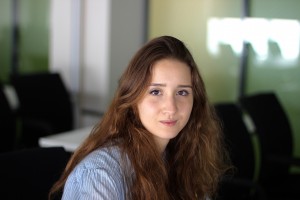 We took this opportunity to talk to the first foreign intern in Skoltech about what are her impressions from her time in Skoltech and how the reality correspond with her expectations, how it was to spend a month and a half studying and working in the Reachbot team, led by prof. Dzmitry Tsetserukou.
We took this opportunity to talk to the first foreign intern in Skoltech about what are her impressions from her time in Skoltech and how the reality correspond with her expectations, how it was to spend a month and a half studying and working in the Reachbot team, led by prof. Dzmitry Tsetserukou.
Ksenia, how did this month and half pass?
Just great! Honestly, I had a slightly different expectations. I knew that I could learn something here, but did not expect that here I will have many opportunities to increase my level of knowledge in programming and robotics. And, of course, a pleasant surprise was the fact that I was getting a lot of attention, and all team members were ready to help.
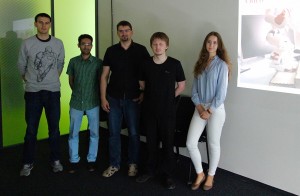 It was really a lot of new things – I’ve never worked with SolidWorks or have experience with 3D-printers, and at Skoltech I had the opportunity and the chance to learn how to use these programs and equipment. In Bucknell it wasn’t available to me. The internship gave me a lot in my specialization. Thanks to the work on the project, I have greatly improved my skills in programming and, among other things, learned several new libraries that can be used in further work. I think that for a student engaged in programming for less than a year, it is a very big step.
It was really a lot of new things – I’ve never worked with SolidWorks or have experience with 3D-printers, and at Skoltech I had the opportunity and the chance to learn how to use these programs and equipment. In Bucknell it wasn’t available to me. The internship gave me a lot in my specialization. Thanks to the work on the project, I have greatly improved my skills in programming and, among other things, learned several new libraries that can be used in further work. I think that for a student engaged in programming for less than a year, it is a very big step.
So, what did you have to do during the internship, was it exactly how you pictured it in your mind?
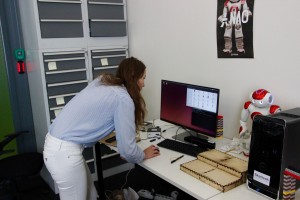 Firstly, I was very interested. I studied mathematics with a focus on programming and it was very interesting to see the result of my work. Before coming to Skoltech, I thought the maximum that I will do here would be to write programs. And here my work was directly linked with the humanoid robot NAO and I didn’t expect this. I’ve never worked with “live” robots and the experience was very valuable, not to mention the fact that it was very interesting. It was nice that I made the right choice in the direction of applied mathematics and, for example, my knowledge of linear algebra helped me to deal with Kinect recognition system.
Firstly, I was very interested. I studied mathematics with a focus on programming and it was very interesting to see the result of my work. Before coming to Skoltech, I thought the maximum that I will do here would be to write programs. And here my work was directly linked with the humanoid robot NAO and I didn’t expect this. I’ve never worked with “live” robots and the experience was very valuable, not to mention the fact that it was very interesting. It was nice that I made the right choice in the direction of applied mathematics and, for example, my knowledge of linear algebra helped me to deal with Kinect recognition system.
Second, despite the fact that my university is small, there are much more students there than in Skoltech and here I got a lot of attention from the head of the practice, professors and colleagues, a lot more than what I could expect in Bucknell. The process of practice was very much alive, and i call it “interactive”. There was a lot of help from my advisor, graduate student Artem Pavlov.
The Skoltech’s official teaching language is English. Was it comfortable for you after the time you spent in Canada and US?
It was convenient. I’ve always been able to switch from one language to another.
Ksenia’s work with NAO, the humanoid robot
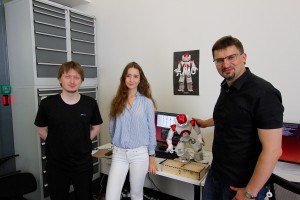 Prof. Tsetserukou: “Ksenia is the first student from the US and Western University, who came to train in my Lab. Frankly, it’s very prestigious and important for Skoltech’s image, when a student from such a prestigious university as Bucknell selects our Laboratory for training. And not just the student, but one of the best, such as Ksenia, who had a position in Top 25% in Canadian Open Mathematics Challenge of the Canadian Mathematical Society and the successful performance at the Canadian Senior Mathematics Contest at University of Waterloo in her background. I cannot not mention Ksenia’s outstanding personal qualities. In addition to good analytical skills, she demonstrated tremendous hard work and academic discipline, which, let’s be honest, sometimes I do not have enough in Russian students. It was very pleasant to deal with an intelligent and talented student, who received the task, not just listened, but heard the teacher and then looked for her own approach and solved the problem.
Prof. Tsetserukou: “Ksenia is the first student from the US and Western University, who came to train in my Lab. Frankly, it’s very prestigious and important for Skoltech’s image, when a student from such a prestigious university as Bucknell selects our Laboratory for training. And not just the student, but one of the best, such as Ksenia, who had a position in Top 25% in Canadian Open Mathematics Challenge of the Canadian Mathematical Society and the successful performance at the Canadian Senior Mathematics Contest at University of Waterloo in her background. I cannot not mention Ksenia’s outstanding personal qualities. In addition to good analytical skills, she demonstrated tremendous hard work and academic discipline, which, let’s be honest, sometimes I do not have enough in Russian students. It was very pleasant to deal with an intelligent and talented student, who received the task, not just listened, but heard the teacher and then looked for her own approach and solved the problem.
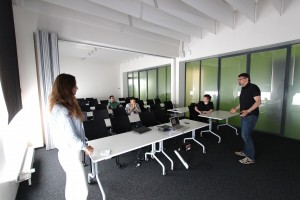 Often our students are all too eager to do everything their own way and unsystematically. For successful learning and knowledge it is very important to follow the advice of your professor and advisor. The ability to listen and hear is a very important quality of a successful student and Ksenia has it is fully. The result of the combination of skills with discipline surpassed not only her, but also our expectations. We managed to do a lot of work. Before the start of the internship, I was thinking something like: “She is smart and will have time to do something.” It turned out that Ksenia was able in almost one and a half months to bring her part of the project to the end, although we had no particular developments in this part of the project. She was able to quickly deal with the robot control system, control its movements with SolidWorks or 3D-modeling, self-made stairs for the robot and mastered with Kinect of 3D-scanning and creating a point cloud. All the problems have been completely different, but she coped with all three.”
Often our students are all too eager to do everything their own way and unsystematically. For successful learning and knowledge it is very important to follow the advice of your professor and advisor. The ability to listen and hear is a very important quality of a successful student and Ksenia has it is fully. The result of the combination of skills with discipline surpassed not only her, but also our expectations. We managed to do a lot of work. Before the start of the internship, I was thinking something like: “She is smart and will have time to do something.” It turned out that Ksenia was able in almost one and a half months to bring her part of the project to the end, although we had no particular developments in this part of the project. She was able to quickly deal with the robot control system, control its movements with SolidWorks or 3D-modeling, self-made stairs for the robot and mastered with Kinect of 3D-scanning and creating a point cloud. All the problems have been completely different, but she coped with all three.”
What do you as the head of the Laboratory carried took for yourself from this internship?
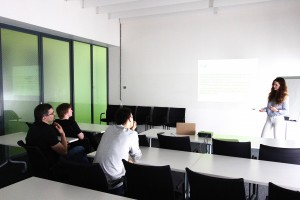 “For me it was important to prove compliance of the Laboratory with expectations of students and prove what we say about its level. We try to do everything for our trainees, to make it convenient to work not only on the part of the equipment, but also on communication. This was not a case of a student who comes to do something on his own, and by the end of the project just comes with the presentation. Ksenia had properly selected Advisor and had almost daily interactive work with team members. For me as the leader, it is important to understand how to build the future internship process, so that students will receive the best possible results out of it, in a very short period of time. Only in this way we will be able to attract good students from really good universities, as future trainees. Speaking about laboratory, I can say that in terms of equipment, technology and the level of projects, we are at a good European level.
“For me it was important to prove compliance of the Laboratory with expectations of students and prove what we say about its level. We try to do everything for our trainees, to make it convenient to work not only on the part of the equipment, but also on communication. This was not a case of a student who comes to do something on his own, and by the end of the project just comes with the presentation. Ksenia had properly selected Advisor and had almost daily interactive work with team members. For me as the leader, it is important to understand how to build the future internship process, so that students will receive the best possible results out of it, in a very short period of time. Only in this way we will be able to attract good students from really good universities, as future trainees. Speaking about laboratory, I can say that in terms of equipment, technology and the level of projects, we are at a good European level.
Ksenia Tsoktoeva: “I have the opportunity to compare my experience in Skoltech to my studies in Canada and the United States, and I agree with Dzmitry – Skoltech and its Robotics Laboratory meet to a very high standard. All you need to work here are good students.”
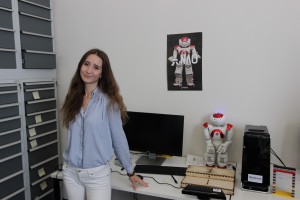 Would you advise your classmates from Bucknell follow your experience?
Would you advise your classmates from Bucknell follow your experience?
Of course yes, but taking in consideration the fact that it is still Russia, and for foreigners who do not speak Russian, life can be quite difficult. All foreign students with whom I have talked say that they like Skoltech, but even in Moscow, for a foreigner life is quite difficult, especially outside the center.
What are the future plans?
I will continue to study at the university, but with experience obtained in Skoltech. I will actively seek opportunities to participate in research projects. I really liked what I was doing on Reachbot project. I will continue to communicate with Dzmitry and the team.
Prof. Tsetserukou: “I think that during the internship we were able to show Ksenia, a programmer by profession, the huge plus of robotics. It is the possibility to use programming for physical objects. A chance to look at the result of your mind’s work. It is very interesting to see the robot starts moving, or a 3D-scanner creates a physical object. Robotics are unique in this ability to reveal that IT is not just a code and nothing else. Robotics provide an opportunity to feel and see how the code works in physical reality, as the robot is moving, car rides etc. This visibility allows the student to form a thirst for knowledge, to work. He realizes that programming is not only working with a computer, and can manage the process. It is very important.”
